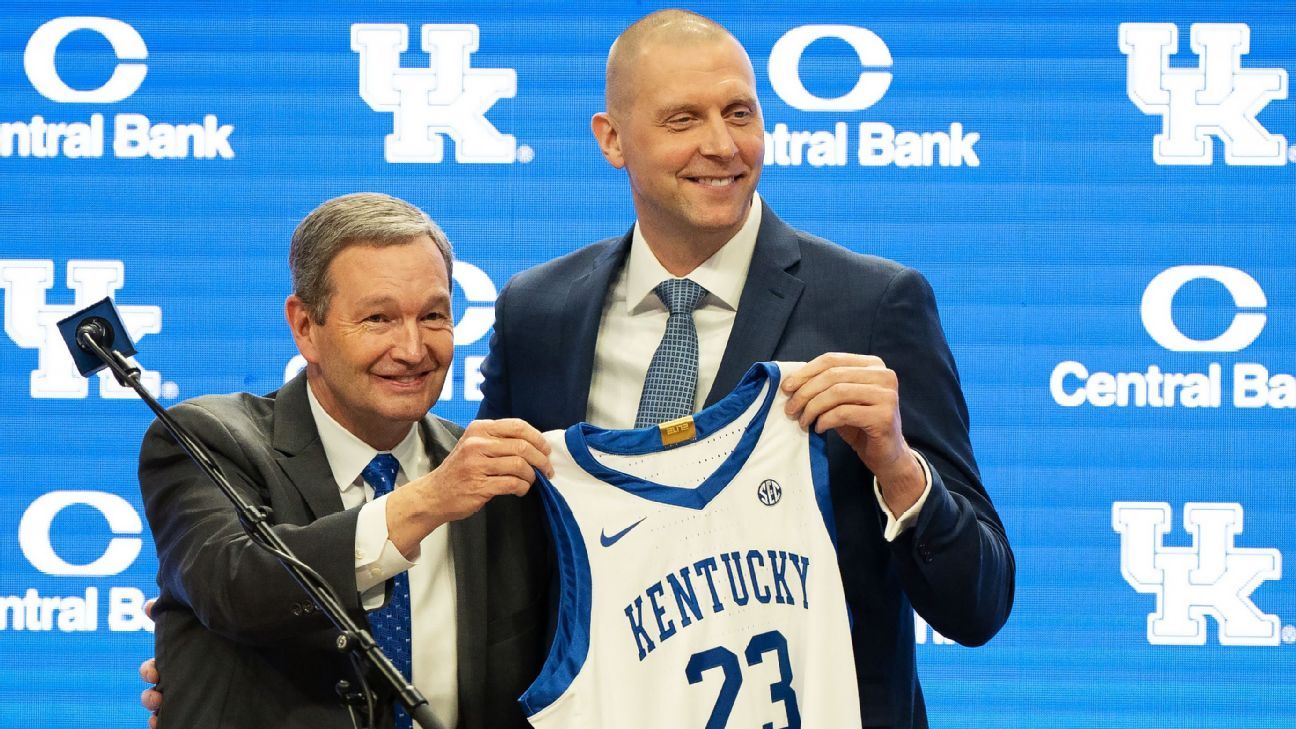Days after John Calipari left town, Mark Pope stood on a podium in front of a sold-out crowd at Rupp Arena on Sunday.
During his official introduction, Kentucky’s new coach, who signed a five-year deal for $5.5 million per season, said he’s aware of the expectations around the program.
“I understand the assignment,” Pope said. “We are here to win banners. As we go through this journey, we’re here to win banners in Nashville (at the SEC tournament) because you guys turn out in Nashville like nobody else and that matters. And our job here and our assignment is here to win banners in the Final Four, national championships. That’s our job.”
Pope’s arrival marked the latest step in a surprising sequence of events that has changed the SEC and men’s college basketball. Three days ago, Calipari was introduced as the head coach at Arkansas following a 15-year tenure that included the 2012 national title. Calipari decided to leave the Wildcats after a series of lackluster postseason finishes and speculation about his future.
Kentucky, widely considered one of the top jobs in the sport, had reportedly pursued elite candidates, such as UConn’s Dan Hurley, Chicago Bulls head coach Billy Donovan, Baylor’s Scott Drew and Alabama head coach Nate Oats. After the school failed to land some of its most coveted candidates, Pope — a member of Kentucky’s 1996 national title team — emerged as athletic director Mitch Barnhart’s pick.
Pope, who has previously coached at both Utah Valley and BYU, told the thousands who gathered for a press conference on Sunday that the leaders at his previous stops always understood his passion for Kentucky, where he averaged 7.9 PPG and 5.7 RPG from 1994 to 1996 following his transfer from Washington. He then played six years in the NBA.
“They know my heart bleeds blue Kentucky,” Pope said. “And (Barnhart) knew that. Maybe, he was a little cautious calling me because he knew I was going to say, ‘Yes,’ before he ever finished the question.”
There were fans outside Rupp Arena hours prior to Sunday’s introduction, a rapid turnaround for a fan base that seemed initially skeptical of the hire before embracing the move. Pope succeeds a coach who had failed to reach the second weekend of the NCAA tournament since 2019 and had suffered two first-round exits over the last three years.
Before he spoke, Pope held the 1996 national championship trophy as he walked onto the court in a bus that featured former players, including members of the 1996 national title team. He then handed the trophy to Derek Anderson, who was one of the stars of that championship squad.
The 6-foot-10 former center said he didn’t have to convince his family to make the move to Lexington. His wife and four daughters were all supportive, he said, once it was clear Kentucky had made him the focus of its search.
Pope has amassed a 187-108 record in his coaching career but he has not won a conference title, a conference tournament championship or an NCAA tournament game. Under Calipari, Kentucky routinely attracted first-round picks. Pope said he is currently recruiting the players on the current team, members of Calipari’s recruiting class who’ve decommitted and players in the transfer portal as he assembles his first roster.
“We’re going to find guys that fit here, the way we play and understand what a gift it is to play at the University of Kentucky,” he said.
At one point, Pope said coaches are “shepherds” and the camera panned toward former Kentucky star Jeff Sheppard, Pope’s college roommate and the father of Reed Sheppard, the Kentucky standout and NBA prospect. But he didn’t mention him directly.
Still, Pope said he only wants players at Kentucky who will respect the program’s history and excel in his system. Last year, more than 50 percent of BYU’s shots were 3-point attempts and the Cougars were also top-60 in adjusted defensive efficiency.
“At BYU, we had the second-most 3-pointers in college basketball,” Pope said. “But at Kentucky, we don’t come in second. My team last year had the fourth-most assists in the country and at Kentucky, we share everything. We’re going to be absurdly aggressive on offense. We’re going to change it up and keep people on their heels on defense.”
Toward the end of the event, Pope said he welcomed the lofty standards because he knew they wouldn’t change, even though he’s not as experienced as some of the top coaches who’ve come before him at Kentucky.
Pope said he’ll turn to his mentors, such as St. John’s head coach Rick Pitino who led Kentucky’s 1996 national title squad, as he navigates the challenges ahead while he attempts to meet the high standards of a school that has eight national championships.
“We’re not ducking it,” he said “That is the assignment.”
